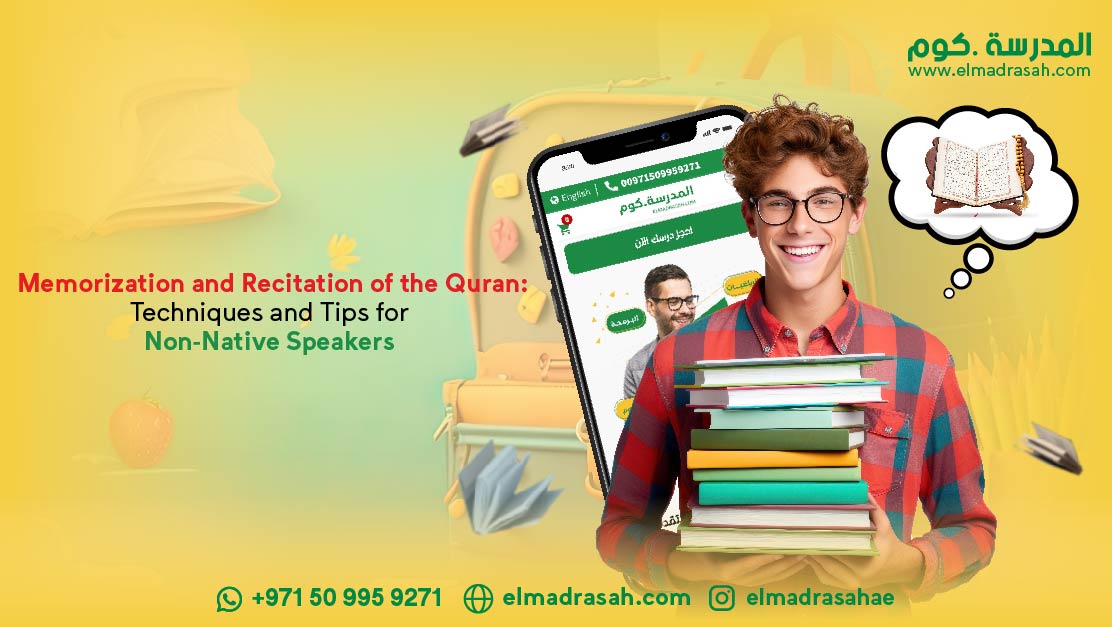
The Quran, the holy book of Islam, is revered for its eloquence, wisdom, and divine guidance. For non-native speakers, memorizing and reciting the Quran can be a rewarding yet challenging endeavor. In this article, we will explore various techniques and tips to enhance the memorization and recitation of the Quran, focusing on the unique challenges faced by non-native speakers.
Understanding the Significance:
Understanding the significance of the Quran is a foundational aspect of approaching its memorization and recitation, especially for non-native speakers. The Quran is not merely a religious text; it is a timeless guide that addresses the complexities of human existence. Here, we delve deeper into why understanding the significance of the Quran is crucial for non-native speakers.
Cultural and Linguistic Barriers:
Non-native speakers often encounter cultural and linguistic barriers that can hinder a profound connection with the Quran. By taking the time to understand the significance of the verses, the underlying messages, and the historical context, non-native speakers can bridge these gaps. This understanding goes beyond the literal translation, allowing individuals to grasp the nuanced meanings embedded in the Arabic text.
Enhanced Memorization:
Understanding the meaning of the Quranic verses significantly aids the memorization process. When non-native speakers comprehend the context and message behind the words they are memorizing, the information becomes more meaningful and memorable. The memorization process transforms from a mechanical task to a spiritually enriching experience.
Deeper Spiritual Connection:
The Quran is considered the literal word of God in Islam, and its verses are believed to contain divine guidance for every aspect of life. For non-native speakers, delving into the significance of the Quran allows for a deeper spiritual connection. It provides insight into the wisdom, mercy, and guidance that the Quran imparts, fostering a sense of reverence and awe.
Application in Daily Life:
Understanding the significance of the Quran is not limited to theoretical knowledge. It involves contemplating how the teachings can be applied in one’s daily life. Non-native speakers can derive practical lessons that are relevant to their personal and societal contexts. This application of Quranic wisdom enhances the transformative power of its message.
Cultivating a Love for the Quran:
A profound understanding of the Quran nurtures a genuine love for the text. Non-native speakers can develop an emotional connection with the verses, finding solace, inspiration, and guidance in the words of the Quran. This love becomes a driving force in the memorization and recitation journey, as individuals are motivated by a sincere desire to internalize and embody the teachings.
Facilitating Communication with God:
For Muslims, the Quran is a direct communication from God. Understanding its significance opens a channel for a personal and intimate connection with the Divine. Non-native speakers can approach the memorization and recitation of the Quran as a form of communication with God, deepening their spiritual journey.
Incorporating these considerations into the memorization and recitation process can transform it into a holistic and enriching experience for non-native speakers. It is not merely about committing words to memory but about embracing the profound significance of the Quran and allowing it to shape one’s understanding, character, and relationship with the Divine.
As non-native speakers embark on their journey to memorize and recite the Quran, the significance of each verse becomes a guiding light, illuminating the path towards a more profound and meaningful connection with the divine words of Islam. Through understanding, they not only navigate linguistic challenges but also unlock the transformative power embedded in the verses of the Quran.
Recitation of the Quran:
Recitation of the Quran, is a fundamental aspect of engaging with the holy book in Islam. Tajweed goes beyond mere pronunciation; it involves understanding the proper articulation of each Arabic letter, the rules governing the combination of letters, and the application of rhythmic and melodic patterns in the recitation. For non-native speakers, Tajweed presents both a challenge and an opportunity to connect more deeply with the Quranic text.
Importance of Tajweed:
Tajweed is not just about ensuring correct pronunciation; it is about preserving the integrity and beauty of the Quranic text. The Prophet Muhammad, peace be upon him, emphasized the importance of reciting the Quran with Tajweed, as it enhances comprehension, reverence, and spiritual connection. Non-native speakers can benefit immensely from Tajweed in their journey of memorization and recitation.
Rhythmic and Melodic Patterns:
The Quran is unique in its rhythmic and melodic patterns. These patterns, known as -Maqamat- and -Tartil,- contribute to the captivating nature of Quranic recitation. Non-native speakers may initially find these patterns unfamiliar, but with consistent exposure and practice, they can integrate these elements into their recitation, adding depth and resonance to their engagement with the Quran.
Online Resources for Tajweed:
Non-native speakers can access a plethora of online resources to learn and practice Tajweed. Platforms like Elmadrasah.com Quran Memorization course provide interactive lessons on Tajweed, guiding learners through the intricacies of correct pronunciation, intonation, and rhythm. These resources often include audio and visual aids, making it easier for non-native speakers to grasp the nuances of Tajweed.
Common Tajweed Rules:
Non-native speakers should familiarize themselves with some common Tajweed rules to enhance their recitation. For instance:
Makhaarij al-Huroof (Points of Articulation): Understanding where each letter originates in the mouth or throat helps in accurate pronunciation.
Rules of Noon and Meem: Proper enunciation of these letters, especially when they have diacritical marks, is crucial for correct recitation.
Rules of Madd (Prolongation): Knowing when to prolong vowels or certain consonants adds fluency and beauty to the recitation.
Personalized Guidance:
Enrolling in a Quran memorization course, such as the one offered by Elmadrasah.com, allows non-native speakers to receive personalized guidance from experienced instructors. These instructors can provide feedback on pronunciation, correct mistakes, and offer valuable tips for improving Tajweed. The live sessions in such courses create an interactive learning environment, fostering a deeper understanding of the intricacies of Quranic recitation.
Emotional Impact of Tajweed:
Beyond the technical aspects, Tajweed contributes to the emotional impact of Quranic recitation. When non-native speakers master Tajweed, they can convey the intended emotions and nuances in the verses, making their recitation more meaningful and spiritually enriching.
Tajweed is a gateway to a profound and spiritually uplifting connection with the Quran for non-native speakers. It is not merely a set of rules but a pathway to understanding and embodying the divine message. Utilizing online resources like Elmadrasah.com Quran Memorization course, non-native speakers can embark on a transformative journey of mastering Tajweed, unlocking the true beauty of Quranic recitation, and fostering a deeper connection with the sacred text.
Tips for Non-Native Speakers:
Tips for non-native speakers embarking on the journey of memorizing and reciting the Quran play a pivotal role in ensuring a meaningful and effective learning experience. Let’s delve deeper into some key tips tailored specifically for individuals facing linguistic and cultural challenges:
Understand the Pronunciation Rules (Tajweed):
Tajweed is the set of rules governing the pronunciation of the Quranic Arabic. Non-native speakers must invest time in understanding these rules, as accurate pronunciation is fundamental to a proper recitation. The Elmadrasah.com Quran Memorization course places a strong emphasis on Tajweed, providing learners with a solid foundation in this essential aspect.
Start with Short Surahs:
Quranic chapters, known as surahs, vary in length. Non-native speakers should begin with shorter surahs to ease into the memorization process. Surah Al-Fatihah, the opening chapter, is a great starting point, as it is short yet rich in meaning. Gradually progressing to longer surahs ensures a gradual and manageable learning curve.
Use Visualization Techniques:
Associating verses with mental images can aid in memorization. Create mental pictures that represent the meaning of the verses. This technique not only enhances memory but also deepens the understanding of the Quranic text. For example, visualize the concept of mercy when memorizing verses that discuss Allah’s compassion.
Repeat and Review Regularly:
Repetition is the key to memorization. Non-native speakers should allocate time each day to review previously memorized verses. This reinforces the learning and prevents forgetting. Spaced repetition, where intervals between reviews gradually increase, is an effective technique implemented in the Elmadrasah.com Quran Memorization course.
Incorporate Audio Resources:
Listening to audio recitations by skilled Quranic reciters is invaluable for non-native speakers. It helps in improving pronunciation, rhythm, and melody of the recitation. The Elmadrasah.com Quran Memorization course includes high-quality audio resources, enabling learners to listen to and emulate correct recitations.
Set Realistic Goals:
Set achievable and realistic memorization goals. Instead of overwhelming yourself with lengthy passages, break down the memorization process into smaller, manageable sections. Celebrate milestones, no matter how small, to stay motivated throughout the journey.
Seek Guidance from Teachers:
Enrolling in a Quran memorization course, such as the one offered by Elmadrasah.com, provides access to experienced instructors. Non-native speakers can benefit from personalized guidance, feedback, and clarification of doubts. Interactive live sessions offered by the course facilitate direct communication with teachers.
Create a Consistent Routine:
Establishing a consistent routine is essential for effective memorization. Allocate specific times each day for Quranic study and recitation. Consistency fosters discipline and helps make memorization a regular part of daily life.
Engage in Reflection:
Memorization is not merely about repetition but also about reflection. Take the time to ponder the meanings of the verses you are memorizing. Understanding the context and contemplating the message enhances the spiritual connection with the Quran.
Join a Memorization Group:
Engaging with a community of learners provides mutual support and encouragement. Joining a memorization group, either in person or online, allows for shared experiences, discussions, and collaborative recitations. The Elmadrasah.com Quran Memorization course fosters a sense of community, enabling learners to connect with peers on a similar journey.
The tips outlined above are tailored to address the specific challenges faced by non-native speakers in memorizing and reciting the Quran. By incorporating these strategies and utilizing resources like the Elmadrasah.com Quran Memorization course, individuals can navigate the journey with confidence, fostering a deep and meaningful connection with the message of the Quran.
Elmadrasah.com Quran Memorization Course:
Elmadrasah.com Quran Memorization Course stands out as an exemplary resource for non-native speakers seeking to master the art of reciting and memorizing the Quran. This online platform seamlessly blends traditional teaching methodologies with cutting-edge technology, offering a comprehensive and accessible learning experience for individuals around the world.
Interactive Lessons:
The heart of Elmadrasah.com’s Quran Memorization Course lies in its interactive lessons. These lessons are thoughtfully designed to cater to the specific needs of non-native speakers. Starting with the fundamentals of Tajweed, learners are gradually guided through the intricacies of Quranic pronunciation and rhythm. The course ensures a progressive learning curve, allowing students to build a solid foundation before tackling more complex memorization tasks.
Progress Tracking:
One of the standout features of Elmadrasah.com is its advanced progress tracking tools. These tools provide learners with real-time insights into their memorization journey. By monitoring their progress, students can identify areas that require additional attention and tailor their study plans accordingly. This personalized approach is crucial for non-native speakers who may face unique challenges in mastering Arabic pronunciation.
Live Sessions:
Elmadrasah.com enriches the learning experience by offering live sessions with experienced instructors. These sessions provide a unique opportunity for students to interact directly with their teachers, seek clarification on challenging topics, and receive personalized feedback. Live sessions foster a supportive learning environment, enabling non-native speakers to overcome language barriers and gain confidence in their Quranic recitation skills.
Community Support:
The importance of a supportive community cannot be overstated in the journey of Quranic memorization. Elmadrasah.com facilitates community building through its platform. Learners have access to forums, discussion groups, and collaborative activities, creating a virtual space where they can share their experiences, exchange tips, and motivate one another. This sense of community is particularly valuable for non-native speakers, as it provides a network of individuals facing similar challenges and aspirations.
User-Friendly Interface:
Elmadrasah.com understands the importance of user experience. The platform boasts a user-friendly interface that is easy to navigate, making it accessible to individuals of all technical abilities. The intuitive design ensures that learners can focus on their studies without being hindered by technical complexities.
Integration of Technology:
In the rapidly evolving landscape of online education, Elmadrasah.com leverages technology to enhance the learning experience. The platform incorporates multimedia elements, such as audio recitations by proficient Quranic reciters, to expose learners to the authentic sound and rhythm of Quranic verses. This integration of technology makes the memorization process more engaging and effective.
Personalized Guidance:
Perhaps one of the most significant advantages of Elmadrasah.com’s Quran Memorization Course is the personalized guidance provided by experienced instructors. Non-native speakers often require individualized attention to overcome pronunciation challenges and to navigate the intricacies of Arabic script. The instructors at Elmadrasah.com are equipped to address the specific needs of each learner, ensuring a tailored and effective learning experience.
elmadrasah.com Quran Memorization Course emerges as a beacon for non-native speakers aspiring to master the recitation and memorization of the Quran. With its blend of interactive lessons, progress tracking tools, live sessions, community support, user-friendly interface, integration of technology, and personalized guidance, this course provides a holistic and effective approach to Quranic memorization. Through Elmadrasah.com, non-native speakers can embark on a transformative journey, not only connecting with the message of the Quran but also fostering a deep and meaningful relationship with the Arabic language and its sacred traditions.
Conclusion:
Memorizing and reciting the Quran is a noble pursuit that transcends linguistic and cultural barriers. Non-native speakers can overcome challenges through understanding, consistent practice, and the right resources. The Elmadrasah.com Quran Memorization course serves as a valuable tool for non-native speakers, offering a structured and comprehensive approach to mastering the art of Quranic recitation. By incorporating these techniques and tips, non-native speakers can embark on a fulfilling journey to connect with the message of the Quran.















